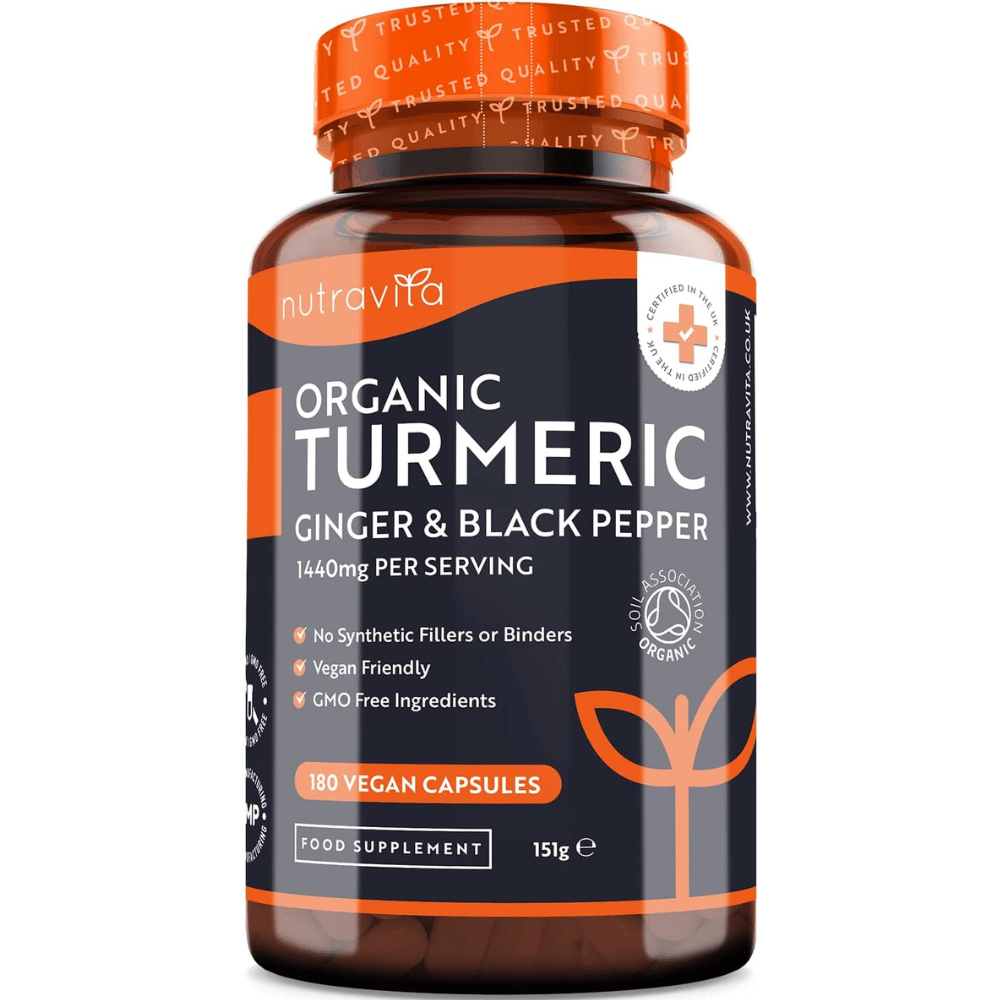Introduction
Turmeric is one of the world’s most versatile superfoods, and has been an important part of traditional ayurvedic medicine for centuries. With its anti-inflammatory and antiseptic properties, it’s no surprise that turmeric can benefit your body in so many ways. But with all this information about when to take turmeric—morning, afternoon, night?—it can be hard to determine the best time to get the most out of this golden wonder. To help make things simpler for you, we researched the subject and put together a comprehensive guide on when to take turmeric for optimal results!
Photo showing Turmeric in its purest form.
Before we dive in let us briefly discuss Turmerics properties and why even the World Health Organization mentions turmerics dosage. Turmeric has been with us since ancient times and its use in traditional medicine is well-known. It has been used to treat everything from wounds to digestive issues, but one of its most remarkable benefits lies in its anti-inflammatory properties. Studies have shown that turmeric can help reduce inflammation and pain, as well as improve blood circulation.
The active ingredients in turmeric are called curcuminoids. Curcumin is the main active ingredient in turmeric which has been found to have anti-inflammatory, antioxidant and even anticancer properties.
When is the best time of day to take Turmeric for inflammation?
The burning question is when do I take it? The best time to take turmeric is in the early morning, on an empty stomach. This is when it will be absorbed into the bloodstream more efficiently, allowing for better utilization of its active ingredients. It’s also important to note that it should be taken with black pepper or some form of healthy fats such as olive oil or ghee, as this will help maximize absorption.
When is the best time of day to take turmeric for Pain?
When is the best time of day to take Turmeric for Pain?
Turmeric has pain-relieving properties and should be taken in the afternoon or evening for the best results. It’s important to note that if you are taking turmeric for pain relief, it’s important to take it with a meal and not on an empty stomach. This will slow down the absorption rate and make sure that the active ingredients are released into your system slowly, over time.
When is the best time of day to take Turmeric for Heart Health?
Turmeric has been found to have beneficial effects on heart health, reducing cholesterol and improving blood circulation. The best time to take turmeric for this purpose is in the morning on an empty stomach. This will help ensure that the active ingredients are more easily absorbed into your system and can start working right away.
How is Turmeric Available To Be Consumed?
Turmeric supplements can be taken in many forms including, capsules, tinctures, turmeric powder or as an integral ingredient in recipes. The best time to take turmeric depends on the form you choose and your individual needs. Here’s a look at when you should take different forms of turmeric:
Capsules: Most experts recommend taking one turmeric capsule twice a day before meals. This will allow your body to absorb the maximum amount of curcuminoids, and provide sustained relief throughout the day.
Photo of turmeric capsules
Tincture: You can take tinctures two or three times a day after meals for best results. Make sure to follow dosage instructions as tinctures are more potent than capsules or powder.
Photo showing turmeric Tincture
Turmeric powder: If you choose to take powdered turmeric, it is best to take it before meals. Powdered turmeric has a bitter taste so adding honey or black pepper can help make the taste more palatable. Taking the powder with food can also help absorb the curcuminoids more effectively.
Recipes: Adding turmeric to your recipes is a great way to get the most out of this superfood. Whether you’re adding it to soup, curry or smoothies—the best time to take turmeric in recipes is immediately after cooking so that it can retain its full nutritional benefits.
Now you know how to consume turmeric you can decide you will take it to best suit your daily life and life stlye.
The Health Benefits of Turmeric
Turmerics' benefits are numerous and has been used for centuries in traditional medicine, and modern science is only beginning to uncover the many wonderful health benefits of this amazing superfood. Here are just a few:
• Anti-inflammatory & Antioxidant Properties – Turmeric helps reduce inflammation, which can relieve pain, improve joint health and promote overall well-being.
The Downside of Turmeric Supplements
Turmeric is generally considered safe to take, but it’s important to be aware of the potential side effects. The most common side effects are stomach pain, nausea, diarrhoea and allergic reactions which can occur when taking large doses of turmeric or if you have a sensitive digestive system. If this occurs, reduce your dosage or opt for a turmeric supplement that has been processed for easier digestion. Additionally, some people may be allergic to turmeric and should consult their doctor before taking any supplementation.
A word of advice though, taking a curcumin supplement or turmeric supplements they aren't magic! If your lifestyle and diet are generally unhealthy, you may not see the same results as someone who is following a healthy lifestyle. Therefore, it’s important to maintain a balanced diet and active lifestyle in order to maximize the benefits of turmeric supplementation.
When should you NOT take a turmeric supplement or curcumin supplement?
Turmeric supplements are generally considered safe for most people, however, it’s important to take into consideration your own health conditions before taking any supplementation. It is not recommended to take turmeric if you have an allergy, gastrointestinal disorders, liver or kidney problems, bile duct obstruction or are taking blood thinners. It is also important to talk to your doctor before taking turmeric if you are pregnant or breastfeeding.
Note - Do not take turmeric if you are on blood thinners because turmeric may interfere with its effectiveness.
Do not take turmeric if you have an iron deficiency as turmeric can interfere with iron absorption.
Do not take turmeric if you have a bile duct obstruction as it may worsen the condition.
Do not take or combine turmeric if you are diabetic as it may cause blood sugar to drop too low.
Do not take Turmeric if you have a gallbladder disease.
To be safe if you have any pre existing health condition or are taking medication, it’s best to talk to your doctor before taking turmeric supplements.
With these guidelines in mind, you can enjoy the many benefits of turmeric safely and effectively! The key is to find what works best for you. So try different forms and methods of incorporating tur
Now that you have a better understanding of when and how to take turmeric, you can make an informed decision about what form is right for you. Whether you choose capsules, tinctures, powders or recipes—turmeric’s anti-inflammatory and antioxidant properties will help you feel your best. Enjoy reaping the many benefits of turmeric!
But don't believe this article go and read the research or do more research of your own.
Turmeric Research
The many studies and dedicated research on turmeric is obviously ongoing and growing but currently, the findings suggest that turmeric can be a beneficial supplement for those looking to improve their health and wellbeing. For more information on the research behind turmeric and curcuminoids, it’s best to consult with your healthcare practitioner before taking a supplement.
A few examples of research on turmeric's benefits for reading at your leisure include:-
The anti-oxidant activity of turmeric (showing it is a powerful antioxidant).
Therapeutic effects of turmeric in several diseases: An overview (Shows taking turmeric has positive effects as an anti-bacterial, anti inflammatory, antimicrobial, and anti-cancer)
Efficacy and safety of turmeric and curcumin in lowering blood lipid levels in patients with cardiovascular risk factors: a meta-analysis of randomized controlled trials (Shows curcumin supplements may help fight against heart disease and high blood pressure)
Anti-inflammatory Effects of Turmeric (Curcuma longa L.) Extract on Acute and Chronic Inflammation Models (shows inflammation is helped through curcumin consumption / turmeric supplement consumption)
The effect of curcumin (turmeric) on Alzheimer's disease: An overview (positive effect of turmeric intake on Alzheimer's disease)
Curcumin, an active component of turmeric in the prevention and treatment of ulcerative colitis: preclinical and clinical observations (study showing the positve effects of taking turmeric for ulcerative colitis)
Choosing Your Turmeric Supplements.
Now that you've decided you want to take turmeric how do you choose which is best for you? Simple, below are two recommendations the Cytoplan is the product the author uses and the Amazon is the second choice.
The Best Turmeric Supplements
Turmeric FAQs
What does the WHO recommend?
World Health Organization (WHO) has determined 1.4 mg per pound (0–3 mg/kg) of body weight is an acceptable daily amount.
What is the correct turmeric dosage?
Turmeric dosage can vary from person to person and depends on your general health, but typically it is recommended to take between 500-2000mg of turmeric extract per day. Always speak with your doctor before taking any supplement and follow the instructions on the packaging carefully.
Is there a daily recommended turmeric dosage?
There is no one-size-fits-all answer to this question as it may depend on many factors including your overall health, as the amount of turmeric required for optimal health benefits varies from person to person. Generally, it is recommended to take 2-3 grams (roughly 1 teaspoon) per day in divided doses. We suggest speaking with your doctor before taking any supplement and following their instructions
Can Curcumin help with brain function?
Yes, curcumin has been studied and found to have a positive effect on brain function. Curcumin increases the growth of new neurons in the hippocampus, which is the part of the brain associated with learning and memory. It also helps protect neurons from damage caused by free radicals and inflammation.
How do I ensure optimal absorption of my curcumin supplements?
To ensure optimal absorption of curcumin, it’s best to take it with a source of fat, such as coconut oil or olive oil. Additionally, adding black pepper can help increase the amount of turmeric that is absorbed by your body. It is also important to note that taking a supplement containing both curcuminoids and piperine can help to increase absorption.
What is golden milk?
Golden Milk is a popular turmeric-infused beverage. It typically contains ground turmeric, coconut oil or ghee, and spices such as black pepper and cinnamon. This beverage is believed to have numerous health benefits due to the powerful anti-inflammatory and antioxidant properties of turmeric. By combining these turmeric supplements with fat and other beneficial ingredients
Conclusion
If you are looking for a holistic approach to inflammation (and overall health) then Turmeric is a powerful antioxidant that has been used in traditional medicine for centuries. It is often recommended for its anti-inflammatory, antimicrobial, and anti-cancer properties. Curcuminoids are believed to be the main active ingredient in turmeric and numerous studies have shown that they can help with a range of health conditions including heart disease, Alzheimer’s, and ulcerative colitis. When taking turmeric supplements, it is important to ensure optimal absorption by taking them with a source of fat such as coconut oil or olive oil and adding black pepper for increased bioavailability.
Speak with your primary care physician before taking any supplement and follow the instructions on the packaging carefully.
Finally, there is no affiliate links here.




